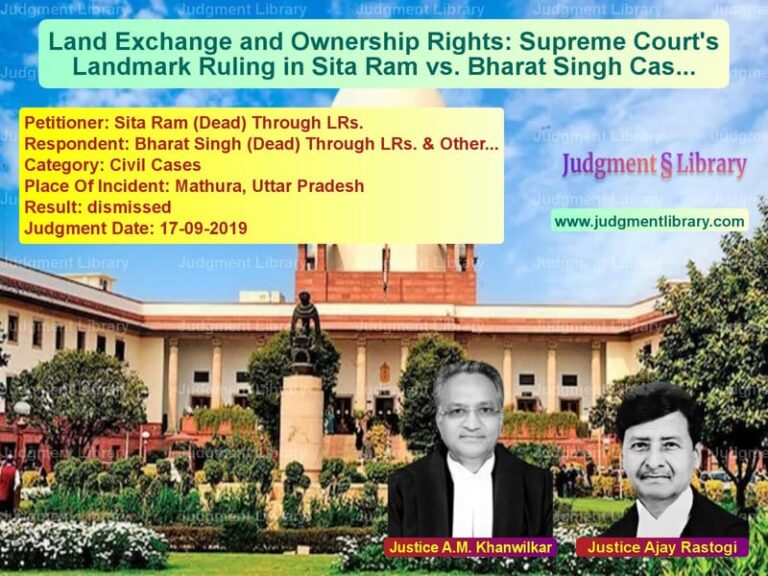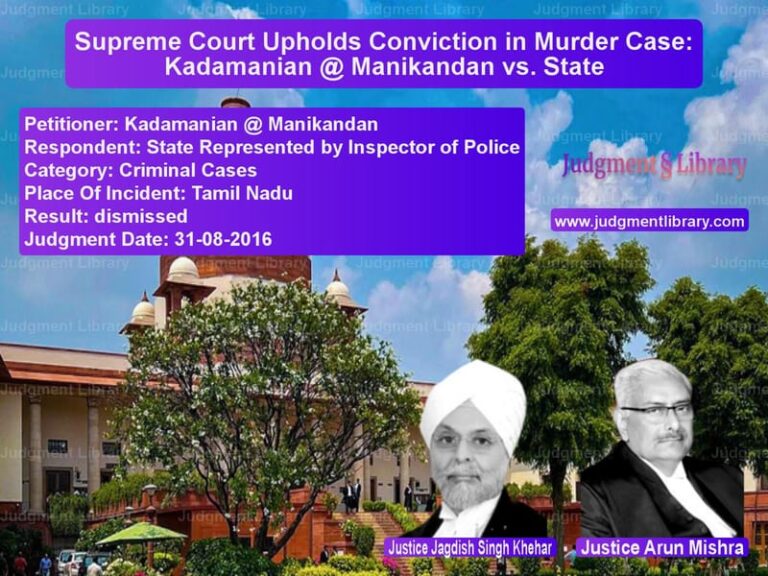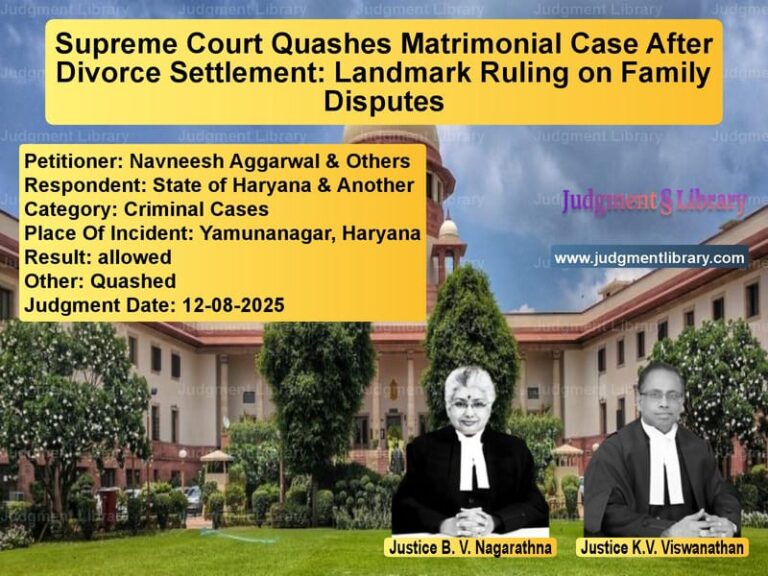SSC Constable Recruitment Case: Supreme Court Overrules High Court on Selection Criteria
The legal dispute over the recruitment process for constables (GD) in the Central Armed Police Forces (CAPFs) and Rifleman (GD) in Assam Rifles has reached a decisive conclusion with the Supreme Court’s verdict in the case of Union of India & Ors. vs. Probir Ghosh & Ors. The Court set aside the Gauhati and Delhi High Court rulings that had directed changes to the final selection list.
The case primarily dealt with alleged irregularities in the recruitment conducted by the Staff Selection Commission (SSC) in 2011. The Supreme Court examined whether candidates who had specified preferences for particular services should be considered for other services if they had scored higher than some selected candidates. Additionally, the Court reviewed whether the rejection of OBC certificates due to incorrect formats was justified.
Background of the Case
The SSC, through a notification dated December 3, 2011, invited applications for recruitment to 48,802 vacancies in various CAPFs such as the ITBP, BSF, CISF, CRPF, and SSB, as well as Assam Rifles. The recruitment process comprised Physical Standards Test (PST), Physical Efficiency Test (PET), a Written Examination, and a Medical Examination.
The notification also outlined specific reservation criteria:
- Category-wise reservations for SC, ST, OBC, and ex-servicemen.
- Reservations for candidates domiciled in Naxal and militancy-affected areas and border districts.
- Upper age relaxation for certain groups, including dependents of 1984 and 2002 communal riot victims.
Legal Challenge and High Court Rulings
Key Issues Raised
After the final selection list was published on October 17, 2012, several candidates filed petitions before the Gauhati and Delhi High Courts, challenging the process on the following grounds:
- Some candidates who had secured lower marks were selected, while higher-scoring candidates were left out.
- Some candidates were classified as belonging to the unreserved category despite submitting OBC certificates.
- Candidates who had indicated preferences for specific forces should still have been considered for appointment in other forces where they scored higher than selected candidates.
The High Courts ruled in favor of the petitioners, directing the authorities to revise the selection process. However, the Union of India and the SSC filed appeals before the Supreme Court, arguing that the decisions undermined the recruitment framework.
Arguments Presented
Petitioners’ Arguments
The selected candidates and SSC argued:
- The recruitment process followed the rules set forth in the notification, which clearly stated that candidates must be considered only for the forces they had preferred.
- The rejection of OBC certificates was justified, as candidates had not submitted them in the prescribed format.
- Altering the selection criteria after completion of the process would create administrative chaos.
Respondents’ Arguments
The aggrieved candidates contended:
- Since some lower-scoring candidates were selected, merit should take precedence over preference.
- The rejection of OBC certificates was arbitrary, as candidates had no control over the format of their certificates.
- The High Court was justified in intervening, as the authorities had failed to act fairly.
Supreme Court’s Observations
The Supreme Court, after reviewing the submissions, ruled in favor of the Union of India and SSC.
On Preference for Posts
The Court held:
“Candidates were explicitly instructed to carefully indicate preferences for posts under different forces. The option, once exercised, was final, and no changes were permitted. Those who chose only one service cannot later claim entitlement to other services based on merit alone.”
The Court rejected the argument that higher-scoring candidates should have been considered for other forces, stating:
“If ranking alone were the sole determinant, preferences would have no meaning. Preferences were designed to allow candidates to choose where they wished to serve, and these must be respected.”
On Rejection of OBC Certificates
The Supreme Court also upheld the rejection of OBC certificates that were not in the prescribed format. The Court emphasized:
“The requirement for OBC candidates to submit certificates in the prescribed format was explicitly mentioned in the recruitment notification. Non-compliance with this condition disqualified candidates.”
On High Court Orders
The Court criticized the High Court’s approach, stating that it had erroneously tampered with the recruitment process. It noted:
“The High Court’s ruling, if upheld, would have nullified the very basis of the recruitment notification and created uncertainty in future selections.”
Final Judgment
The Supreme Court ruled:
- The High Court decisions were set aside.
- The selection process, as conducted by the SSC, was upheld.
- The preference-based allocation of candidates to services was valid and could not be altered post facto.
- The rejection of OBC certificates for being in the incorrect format was justified.
Impact of the Judgment
The Supreme Court’s ruling has far-reaching implications:
- Merit vs. Preference: It reinforces that candidates’ stated preferences must be respected, even if lower-scoring candidates are selected based on their flexibility.
- Strict Compliance with Rules: Candidates must follow all procedural requirements, including submitting caste certificates in the correct format.
- Limited High Court Intervention: The judgment curbs judicial interference in well-established recruitment processes unless there is clear evidence of illegality or discrimination.
This decision provides clarity on the importance of following recruitment norms and serves as a guiding principle for future recruitment disputes.
Petitioner Name: Union of India & Ors..Respondent Name: Probir Ghosh & Ors..Judgment By: Justice Hemant Gupta, Justice V. Ramasubramanian.Place Of Incident: India.Judgment Date: 17-02-2022.
Don’t miss out on the full details! Download the complete judgment in PDF format below and gain valuable insights instantly!
Download Judgment: union-of-india-&-ors-vs-probir-ghosh-&-ors.-supreme-court-of-india-judgment-dated-17-02-2022.pdf
Directly Download Judgment: Directly download this Judgment
See all petitions in Recruitment Policies
See all petitions in Public Sector Employees
See all petitions in Employment Disputes
See all petitions in Promotion Cases
See all petitions in Judgment by Hemant Gupta
See all petitions in Judgment by V. Ramasubramanian
See all petitions in allowed
See all petitions in Quashed
See all petitions in supreme court of India judgments February 2022
See all petitions in 2022 judgments
See all posts in Service Matters Category
See all allowed petitions in Service Matters Category
See all Dismissed petitions in Service Matters Category
See all partially allowed petitions in Service Matters Category







